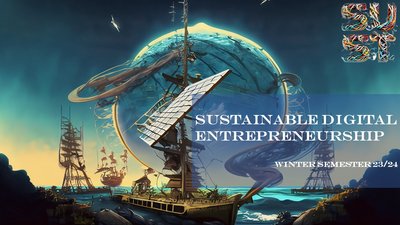Teaching
We conduct research on the intersection between digital entrepeneurship, digital ecosystems, and organizing data and knowldedge. We will provide multiple courses that help to explain changes on firm- and ecosystem levels using multiple theories and methodologies. Our teaching is usually highly interactive and builds upon concepts of blended learning, oftentimes 'flipping the classroom'. It is important to us to not only reflect latest findings of information systems research with our students but also to work together on applying that knowledge.
Our teaching extends to Bachelor, Master, PhD and Postdocs. Offers for PhD and PostDocs will be more clearly defined in the following months.
Winter 23/24

Sustainable Digital Entrepreneurship (sust-de)
- Lecturer:
- Tomasz Waliczko, M.Sc.
- Prof. Dr. Hannes Rothe
- Contact:
- Term:
- Winter Semester 2023/2024
- Time:
- Tuesdays, 08:00-10:00
- Room:
- R11 T04 C36
- Start:
- 10.10.2023
- End:
- 02.02.2024
- Language:
- English
Important Notes:
COURSE REGISTRATION
Send your application to sekretariat.SUST@icb.uni-due.de.
In your application include your grades transcript.
Extended submission deadline!
Deadline: 08.10.2023
Results: 09.10.2023
Description:
The module Sustainable Digital Entrepreneurship is an integrative course on the basics of digital entrepreneurship and sustainability. The course focuses on providing students with entrepreneurial and sustainability competences by solving real life business case studies. Within the frameworks of the course students will learn the following aspects: (a) team building, (b) innovation in digital startups, (c) startup sustainability and (d) prototyping (e) solving real-life case studies. The students are expected to achieve capabilities to explore the mentioned aspects in group case study projects and individual assignments.
The course offers lectures on the topic mentioned above, individual assignment workshop and special lectures with startups who will explain to students the peculiarity of the case studies. On top of that students will have a chance to experience a startup environment in Place Beyond Bytes. The course consists of individual assignment (30% of the grade) and group case study project (70% of the total grade). This course is designed to follow an integrative teaching approach with industry experience.
This course is eligible to collect credits for the Sustainable Education Certificate (BNE)
Learning Targets:
- team building;
- innovation in digital startups;
- startup sustainability;
- paper prototyping (lecture and workshop);
- workshop on basic business plan modeling;
- workshop on case study;
- coaching in the process of case study preparation.
Outline:
- Sustainability
- Startups;
- Team work;
- Design Thinking;
- Digital Entrepreneurship;
- Innovative Entrepreneurship;
- Business research
Literature:
- Dorofeeva, VV (2021, March). Opportunities for universities to use the German experience in the startup ecosystem development. In IOP Conference Series: Earth and Environmental Science (Vol. 689, No. 1, p. 012015). IOP Publishing.
- Liedtke, M., Asghari, R., & Spengler, T. (2021). Fostering entrepreneurial ecosystems and the choice of location for new companies in rural areas–The case of Germany. Journal of Small Business Strategy (archive only), 31(4), 76-87.
- Thirasak, V. (2019). Building an effective startup team. In International Conference on Advances in Business and Law (ICABL) (Vol. 3, No. 1, pp. 18-27).
- George, G., Merrill, RK, & Schillebeeckx, SJ (2021). Digital sustainability and entrepreneurship: How digital innovations are helping tackle climate change and sustainable development. Entrepreneurship Theory and Practice, 45(5), 999-1027.
Methods of Assessment:
Portfolio

